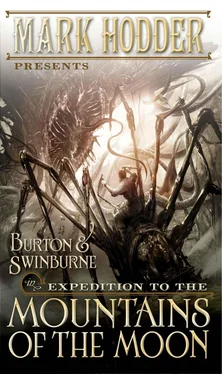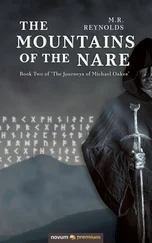Mark Hodder - Expedition to the Mountains of the Moon
Здесь есть возможность читать онлайн «Mark Hodder - Expedition to the Mountains of the Moon» весь текст электронной книги совершенно бесплатно (целиком полную версию без сокращений). В некоторых случаях можно слушать аудио, скачать через торрент в формате fb2 и присутствует краткое содержание. Жанр: sf_stimpank, на английском языке. Описание произведения, (предисловие) а так же отзывы посетителей доступны на портале библиотеки ЛибКат.
- Название:Expedition to the Mountains of the Moon
- Автор:
- Жанр:
- Год:неизвестен
- ISBN:нет данных
- Рейтинг книги:5 / 5. Голосов: 1
-
Избранное:Добавить в избранное
- Отзывы:
-
Ваша оценка:
- 100
- 1
- 2
- 3
- 4
- 5
Expedition to the Mountains of the Moon: краткое содержание, описание и аннотация
Предлагаем к чтению аннотацию, описание, краткое содержание или предисловие (зависит от того, что написал сам автор книги «Expedition to the Mountains of the Moon»). Если вы не нашли необходимую информацию о книге — напишите в комментариях, мы постараемся отыскать её.
Expedition to the Mountains of the Moon — читать онлайн бесплатно полную книгу (весь текст) целиком
Ниже представлен текст книги, разбитый по страницам. Система сохранения места последней прочитанной страницы, позволяет с удобством читать онлайн бесплатно книгу «Expedition to the Mountains of the Moon», без необходимости каждый раз заново искать на чём Вы остановились. Поставьте закладку, и сможете в любой момент перейти на страницу, на которой закончили чтение.
Интервал:
Закладка:
“Do you know who I am?” Lettow-Vorbeck said, in strongly accented English.
Without opening his eyes, Burton replied: “Generalmajor Paul Emil von Lettow-Vorbeck. You command the German forces in East Africa.”
“That is correct. Sehr gut. So.”
Burton heard a chair scrape on the floor and creak as the other man sat down. There was a soft thump-the briefcase being swung up onto the desk-and a click as it was opened.
“I have here a file in which you feature with some considerable prominence.”
Burton didn't respond. He was hungry and thirsty, but most of all he needed to sleep.
“Private Frank Baker, captured on the western slopes of the Dut'humi Hills two years ago. You were alone-a refugee from the failed British assault on the Tanganyika Railway.”
There was a long moment of silence. Burton had still not opened his eyes. He thought about Bertie Wells and the night they'd slept in the open, beside Thomas Honesty's grave. The temperature had plummeted after sunset, and during the hours of darkness both of them developed a fever. Burton's dreams had been filled with violence; with scenes of Prussians and Arabians slaughtering each other-and he'd woken up soaked with dew, filled with memories, and cursing himself. How could he have forgotten there was a village nearby? Just along the trail!
Wells was in the grip of hallucinations, which-to judge from his babbling monologues-involved insects crawling out of the moon, invisible madmen, and three-legged harvestmen. With what little strength remained to him, Burton had hauled the war correspondent to his feet and dragged him along an overgrown trail that eventually opened into another clearing where a decrepit village stood. Its menfolk were long gone-conscripted-and the remaining villagers were elderly and half-starved. Burton left Wells with them while he went to hunt game.
But he'd become the prey. Three lurchers had blundered out of the undergrowth and pursued him across boggy ground and into thick jungle. It was peculiar; he felt certain they could have caught him, but instead they appeared to be herding him along.
One of them sprouted poppies as it floundered after him.
By the time he'd eluded them, he was lost and in the grip of malaria.
The Germans found him unconscious at the side of a trail. Since then, he'd spent nearly two years in the Stalag III POW camp before his recent transfer to Ugogi.
Large parts of his memory had returned. He knew he was the king's agent. He was aware that Algernon Swinburne, William Trounce, Thomas Honesty, Maneesh Krishnamurthy, Herbert Spencer, Sister Raghavendra, Isabella Mayson, and Isabel Arundell had travelled to Africa with him. But he didn't know why, what had become of them, or how he'd been transported into the future.
He'd been here for four years. Four years!
Why? For what purpose?
“Why?” Lettow-Vorbeck said.
Burton opened his eyes and met those of the generalmajor. Behind the officer's head, pencil-thin shafts of light shone through the slats of the window shutter. Motes of dust entered them, blazed, then vanished into the shade. Against this illumination, Lettow-Vorbeck's features were very dark-almost silhouetted-but by some quirk, his eyes shone with an almost feral intensity.
“Why what?”
“Why are you British so destructive? Do you not believe in evolution?”
“Evolution? What do you mean?”
The officer drummed the fingers of his right hand on the desktop.
“The Greater German Empire seeks to advance the human species. We wish to liberate every man and every woman from slavery so that each can fulfil his or her greatest potential. So each can become an Ubermensch. Perhaps this translates as ‘Over Man,’ ja?”
Burton gave a snort of disdain. “I don't think your Askaris feel particularly liberated.”
“Nein. Nein. And it is the fault of your people. We are forced to employ the Africans to oppose British assaults on the infrastructure we are building here. Were it not for your people, Africa would have atmospheric railways and well-developed cities by now. And Europe would be a paradise, where trivial jobs and the necessities of survival are taken care of by plant life, leaving the human species free to explore its best potentials. Instead, we must assign our resources on both continents to resisting your vandalism.”
Burton's breath whistled from between his teeth. “It's always the same,” he said. “A madman creates a plan for the future of humanity, and, in unleashing it, causes untold suffering. Generalmajor, do I really need to point out that your vegetation is proliferating without check, or that while many individuals may be capable of advancing themselves, most are content to be well fed and sheltered and wish for little more?”
Lettow-Vorbeck nodded thoughtfully. “Es trifft zu , what you say of our plants. But that situation will be corrected once hostilities cease. As for your suggestion that the populace is not willing or able to evolve-I cannot agree. It is typical British thinking, for you built your Empire on the premise that an educated and privileged minority should benefit from the labours of a downtrodden majority.”
Lettow-Vorbeck suddenly slapped his hand down on the thick dossier that lay before him. “So! Lassen Sie uns auf den Punkt kommen! No more-what is the expression? — beating around the bush?” He put his elbows on the desk and steepled his fingers in front of his face. “Ich kenne die Wahrheit. Your name is not Frank Baker. You are Sir Richard Francis Burton. You were born in the year 1821. You died in the year 1890. And you were sent to the year 1914 from the year 1863. Es ist ein au?erordentlicher Umstand! Unglaublich!”
Burton sat bolt upright. His exhaustion fell away.
Lettow-Vorbeck gave a slight smile, his teeth white in the shadow of his face. “Sehr gut. Sehr gut , Herr Burton. I have your full attention now. You will listen to me, ja? I have a story to tell you. But first a question: do you possess die telepathischen Fahigkeiten?”
“Mediumistic abilities? No.”
“Nor I. Hah! It is a misfortune! I should like them! You are aware, ja , that many people do? In increasing numbers, it appears. Your Colonel Crowley has his people-and they are strong-while we Germans have our weathermen, and, of course, the Kaiser himself, who is the greatest Gedankenleser -medium-of them all.”
Burton's right eyebrow rose slightly. “Nietzsche styles himself emperor now, does he?”
“Es ist angebracht, dass!”
A large fly buzzed lazily around Lettow-Vorbeck's head and landed on the desk. The German picked up the dossier and whacked it down onto the insect. He flicked the flattened corpse onto the floor and resumed his former position.
“And in Russland , there was Grigori Rasputin, also a great Gedankenleser , who, as you may know, died of-how do you say Hirnblutung?”
“Brain haemorrhage,” Burton answered.
“So. Ja. Thank you. He died of that two years ago. It is him my story concerns.”
Burton remained silent.
Lettow-Vorbeck pointed a finger down at the report lying in front of him.
“This dossier was entrusted to me by Kaiser Nietzsche himself. It contains information that no other man is aware of-just he and I-and now I will tell you.”
Still Burton said nothing.
“Thirteen years ago, after we were forced to destroy your nation's capital city, our troops discovered a number of black diamonds beneath the rubble of the Tower of London. They were the seven fragments of the Cambodian Eye of Naga, and the seven of the African Eye. We know this because documents concerning them were also found, and, in these documents, another Eye-from South America, and also in seven pieces-was described. Of it, though, there was no sign. You know of what I speak, ja?”
Читать дальшеИнтервал:
Закладка:
Похожие книги на «Expedition to the Mountains of the Moon»
Представляем Вашему вниманию похожие книги на «Expedition to the Mountains of the Moon» списком для выбора. Мы отобрали схожую по названию и смыслу литературу в надежде предоставить читателям больше вариантов отыскать новые, интересные, ещё непрочитанные произведения.
Обсуждение, отзывы о книге «Expedition to the Mountains of the Moon» и просто собственные мнения читателей. Оставьте ваши комментарии, напишите, что Вы думаете о произведении, его смысле или главных героях. Укажите что конкретно понравилось, а что нет, и почему Вы так считаете.












